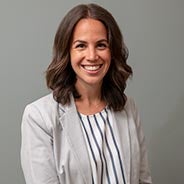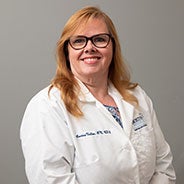Mara Garwood and Corina Valvo explain the importance of diabetes education and how BMC's 'conversation mapping' courses for patients to help keep them on track.
Featured Speakers

Mara Garwood RD, CDE
Mara Garwood RD, CDE is a Registered Dietitian/Certified Diabetes Educator.

Corina Valvo RN, CDE
Corina Valvo, RN, CDE is a Nurse/Certified Diabetes Educator.
Transcription
Melanie Cole, MS (Host): When you think of education, you might imagine a lecturer, a set of slides, a room full of listeners. Until a decade ago, these were the staples of diabetes self-management education, but not so much anymore. My guests in this panel discussion today are Mara Garwood—she’s a registered dietician and certified diabetes educator—and Corina Valvo—she’s a registered nurse and certified diabetes educator and they're both at Boston Medical Center. Mara, I'd like to stay with you. Tell us a little bit about the conversation map program. What is that?
Mara Garwood RD, CDE (Guest): Sure. So the conversation map program is a learning class basically that was developed in collaboration with the American Diabetes Association. It doesn’t use your traditional lecture based approach to learning. It uses more of a collaboration approach with participants and with the instructor. So it uses prompts and pictures to kind of open discussion around health and diabetes related issues, and it keeps the conversation flowing with these different pictures that kind of take you through a journey with some of these problems and issues and topics that often come up in our diabetes classes.
Host: Corina, why was the need for this and how is it different from more traditional lecture based approaches to learning? Did somebody see a need for this type? Why?
Corina Valvo RN, CDE (Guest): Well, in education it is important that the students are engaged in what they're learning about. In the traditional lecture, many times people do not get the chance to participate in the discussion. The students can really learn from each other’s experiences as well as the facilitator, who is the educator, can give the information in a way that can have the students think of questions and participate.
Mara: I’d also like to add in there too, the instructors and the participants, they definitely all learn from each other. We find for people to really learn and utilize the information. When personal stories are used, they're more likely to be comprehended and taken further in their life rather than one of the instructors just providing a handout and a PowerPoint. So when things are a little bit more personal, people can kind of relate to it and take it further with them in their health journey.
Host: Well, I can totally understand that. As someone who’s an educator myself, when it is more interactive, you do find that they learn more. Mara, sticking with you for just a minute, tell us a little bit about how they're guided and run. Who facilitates these classes?
Mara: So the facilitator is going to be a health professional. So in our setting, we have nurses, dieticians. Some of our nurse practitioners might get involved or pharmacists might get involved, but people kind of in this health field. There’s four different basically posters. These three by five foot posters that have pictures on them. Each facilitator will have a guide to kind of take you through the different pictures. So, again, there’s four main classes that we typically go through. Each of them has a different topic, different pictures, different kind of settings for the conversation.
Host: Corina, let’s talk about some of those different pictures and the conversation map topics. What are you looking to teach people that have diabetes, whether they are newly diagnosed or have had it a while. What is the goal? What are you aiming to teach them?
Corina: Well, the goal is to give people the tools necessary to create a plan that they can use in their everyday life. The first class is called ‘On the Road to Better Managing Your Diabetes’. Basically, it’s an overview of what diabetes is, some of the myths that surround diabetes—because a lot of times people get information from other sources that could be true for one person, but not another. Then there’s also a class on how healthy eating is important and diabetes. Another class where it talks about the monitoring of diabetes, and the target goals for the numbers, for your blood sugar numbers and your A1C and other important labs that people have done when they have diabetes. Then the last class is sort of continuing the journey and giving people tools on how to go out and read through labels, pick foods that will support their healthy eating habits—including exercise as a tool also to help control people’s blood sugars.
Host: What great topics and so easily learnable. So Mara, tell us how it helps people to steer the discussion toward the aspects of management that are most important to their specific needs and lifestyles. Do they find that this educational tool is too easy? Do they find it fits very well into managing their lifestyle? What do they think of the program?
Mara: So I think the program provides a unique opportunity for people to make explore topics they’ve not explored with their support system, with their family members, with friends. It gives people an opportunity to see a poster and maybe start to identify themselves in the poster and see that the other participants in the room also have felt that. So thinking about an example where there’s people sitting at a picnic table. Someone looks pretty upset because they can’t choose a certain food. People might really identify with that and say, “Oh, I've felt that way before at a graduation party, and this is what I did.” Or sometimes I bring this with me so I'm sure that I have something special for me to eat and share with others so I can include them in my health, in my diabetes journey.” It really opens the opportunity for people to explore more about themselves that isn’t necessarily written.
So pictures provide this unique opportunity for people to interpret what they see, share what they see, and see if other people in the room—including the facilitators—have experienced that or heard about other people overcoming a challenge or facing a challenge currently and then working with other people in the room of how they can overcome it that week, that day, that month. So these maps do a nice job of providing open opportunity for conversation to flow instead of saying, “We’re talking about nutrition today. Here’s everything you can't eat.” We want to get away from that and talk about, “Here is a map with different pictures of food, different opportunities where you might eat. Let’s talk about it.”
Corina: I would like to add that along with the maps, there are also conversation cards that are handed out to the participants with different information and prompts so that it can get people thinking about their everyday lives and the challenges they feel.
Host: So Corina, really, just what a great way for these people to learn and get involved in their learning. How many people are in each class?
Corina: Well, typically a good number would be four to six. We want there to be enough people in the group that you can have a healthy conversation, but you don’t want there to be too many people in the group so that somebody gets drowned out. Everybody really does need to participate. The way that the program is set up, it really encourages everybody in the group to participate.
Host: Mara, are these education courses covered by insurance? Tell us a little bit about how that whole process works, and how somebody gets involved in the program in the first place.
Mara: So I’ll touch on the how to get involved, and then I’ll pass it on to Corina to talk more about the insurance. She’s the pro at that. In terms of getting involved, we’re trying to open our doors to kind of helping people want to participate in these sessions. So having conversations with primary care providers or having conversations with endocrinologists or your nurse educators and say, “Hey, I heard about these classes being offered at BMC. Can you put in a referral for me or send me to the person who needs to put the referral in for me so I can get going on these classes?
Corina: The insurance piece is most commercial insurance programs. So the Blue Cross Blue Shield. The programs do cover these classes. Mass Health will also cover the classes. Medicare will cover the classes with a specific diabetes education referral. So if a person is on Medicare, what they need to do is talk to their doctor about sending the diabetes education referral to the clinic, and then we can place them in a class.
Host: What a really great way for positive reinforcement to work. Corina, first last word to you. What would you like the listeners to know about conversation maps for diabetes education, and how important it is for that back and forth and that interaction to help them learn lifestyle behaviors.
Corina: Well, I think that diabetes is different for everyone. Having the personalized curriculum that people can discuss, think about, and then share helps everybody. The program can be beneficial for people who are newly diagnosed. It can be beneficial for people who have had diabetes for many years and struggling with questions and just want to learn more and do a better job of taking care of themselves.
Host: Mara, last word to you. Tell us how your certified diabetes educators offer patients this fun way to develop those necessary tools that can help them balance diet, exercise, medications. Wrap it up for us with your best advice about these classes and who they are so helpful when people can interact and learn together.
Mara: Sure. So if you’re looking for an opportunity to learn more about a certain condition or learn about yourself in kind of the health lens, it’s really a great opportunity for you to join a group of people who’ve learned from themselves, they’ve learned from others, and be led by a certified diabetes educator who has kind of a unique scope on the field. We all have our own professional licenses, but then we have the CDE that opens our eyes to more of the social impacts of having a certain condition, or more of the psychological things that might be going on or have a better understanding of medications that we might not otherwise know a lot about. So we offer good perspective, and they are fun because we’re working with a lot of different personalities. We’re working with these colorful posters that just keep things bright, happy, and interesting. You would never leave the class feeling bored or feeling like you didn’t get anything out of it. So it’s a great opportunity and we hope you join us.
Host: Thank you ladies so much for coming on and sharing that information about those conversation maps for diabetes, and how great of a tool this is for education. That wraps up this episode of Boston Medtalks with Boston Medical Center. Head on over to our website at bmc.org/diabetes for more information on the conversation map classes and to get connected with one of our providers. If you found this podcast as cool as I did and what a great program, please share with your friends and family on social media and be sure to check out all the other interesting podcasts in our library. I'm Melanie Cole.
 en
en 
 Français
Français Deutsch
Deutsch Italiano
Italiano Español
Español Tiếng Việt
Tiếng Việt Kreyol ayisyen
Kreyol ayisyen